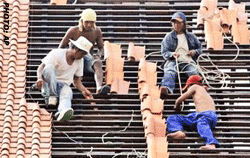
| By ALISA TANG/AP WRITER/TAKUA PA, THAILAND | Monday, June 27, 2005 |
Migrant workers from
Despite their economic role, they say they have become forgotten victims of the disaster—having received little or no aid from either
 “When I come here to help do construction work for them (the Thais), I make them happy, but when something happens to me, they don't help me,” 56-year-old Aung Than said, holding two photos of his son and nephew, who were killed in the tsunami along with his niece. Only the body of his nephew was found, while the other two are still missing.
“When I come here to help do construction work for them (the Thais), I make them happy, but when something happens to me, they don't help me,” 56-year-old Aung Than said, holding two photos of his son and nephew, who were killed in the tsunami along with his niece. Only the body of his nephew was found, while the other two are still missing.
About 5,400 people died in the tsunami along
Some officials believe as many as 1,000 of the migrants died, but the exact number may never be known because of the large number of undocumented workers. Many migrants also refused to go to official mortuaries to identify their colleagues, fearing police would arrest them for not having work permits.
The Tsunami Action Group, a non-profit organization that helps migrant workers from
The reconstruction boom in the Khao Lak resort area on Phang Nga's coast makes the area look like a city being built from scratch. Earning about US $3 to US $6 (euro2.50 to euro5) for a day's work, the Burmese comprise a majority of the labor, living in temporary shelters behind the luxury resorts they are building.
Aung Than and his co-workers described the inequality of tsunami aid on a lunch break at their corrugated metal shanties. Among them was a small, sinewy 13-year-old boy who earned 100 baht (US $2.50; euro2) a day mixing and transporting cement. A rash covered the boy's shoulders, back and chest with sand grain-sized bumps.
There was less bitterness in their voices than a mere sad acceptance of their fate as the poorest of
“My life was very hard in
While the Thai government handed out US $500 (euro400) to each Thai survivor, most of the Burmese, who have contributed greatly to
Thai police made
Min Zaw, a 26-year-old construction worker who lost both his in-laws, helped an injured Western tourist flee the waves, and then fled himself to
“I came back, but of my former work crew of 20 guys, 16 are in
Amnesty International in a report this month said
Still, hundreds of thousands have fled
“They asked if we were Thai or Burmese. When we said Burmese, they told us, 'Get out of here” said Yee Than, 32, who was born in
How does that make her feel?
“We're poor people. We don't feel anything.”